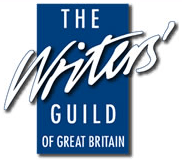Writers' Guild of Great Britain
 | |
| Full name | Writers' Guild of Great Britain |
|---|---|
| Founded | 1959 |
| Members | 2,005 (2013)[1] |
| Affiliation | TUC, IAWG |
| Key people | David Edgar, president |
| Office location | London, England |
| Country | Great Britain |
| Website |
www |
The Writers' Guild of Great Britain, established in 1959, is a trade union for professional writers. It is affiliated with both the Trades Union Congress (TUC) and the International Affiliation of Writers Guilds (IAWG).
Activities
It represents writers working in television, radio, film, theatre, books and multimedia.
It negotiates a series of Minimum Terms Agreements governing writers' contracts and covering minimum fees; advances; repeat fees, royalties and residuals; rights; credits; number of drafts; script alterations and the resolution of disputes. The most important MTAs cover: BBC TV Drama; BBC Radio Drama; ITV Companies; PACT (independent TV and film producers); TAC (Welsh language independent TV producers); Theatrical Management Association; Independent Theatre Council; and an agreement covering the Royal National Theatre, Royal Shakespeare Company and Royal Court Theatre. These agreements are regularly renegotiated and in most cases the minimum fees are reviewed annually.
The Guild advises its members on all aspects of their working lives. This includes contract vetting, legal advice, help with copyright problems and representation in disputes with producers, publishers or other writers.
Regular events are organised for members. Recent examples (2004–2005) were a seminar on writing sitcoms, a networking evening for TV soap writers, a panel discussion on marketing theatre plays, a celebrity event at the Edinburgh Book Festival and a series of lectures on forensic science aimed at TV series writers. The Annual General Meeting each spring features an address by a well-known member, an opportunity to debate issues of importance to writers and amend the Guild's rules, plus a free lunch.
UK Writer is the Guild's quarterly magazine, free to members, containing features about professional writing and news about the Guild and its members.
Lobbying
The Guild is a campaigning union and recent effective lobbying efforts have concentrated on MEPs considering the European copyright directive, and MPs, peers and the media over the Communications Bill and the BBC Charter renewal. The Guild made strong protests when crowd violence halted performances of Behzti by Gurpreet Kaur Bhatti at the Birmingham repertory theatre in December 2004, and subsequently revived its Anti-Censorship Committee. The Guild makes a point of highlighting the importance of writing for children in all media. It co-operates closely with other unions including Equity, the Musicians' Union and the Society of Authors; and is affiliated to the British Copyright Council, Creators' Rights Alliance, Campaign for Press and Broadcasting Freedom and other pressure groups. Guild representatives attend regular briefings with the Arts Council, Ofcom, the Public Lending Right agency and other national bodies.
International affiliations
International connections include: International Affiliation of Writers Guilds (screenwriters guilds in the UK, US, Canada, Ireland, Australia, New Zealand, France and Mexico); European Writers Congress (over 50 organisations); Fédération des Scénaristes d'Europe (screenwriters' groups in 14 countries); UNI-MEI (worldwide trade union organisation representing millions of workers in the TV, film, media and entertainment industries). The Guild has a reciprocal membership and services arrangement with the Irish Playwrights and Screenwriters Guild. UK Guild members who achieve TV or film writing contracts in the US can join the Writers Guild of America without paying the usual $2,500 initial fee.
Welfare
The Writers' Guild Pension Scheme provides personal pension plans customised for freelance writers who may need to make irregular and sometimes small pension contributions. The scheme is coupled with clauses in several Guild MTAs entitling members to pension contributions in addition to their writing fees.
Over the years the Writers' Guild Welfare Fund has accumulated more than £45,000, which is available to provide loans or grants to members in financial difficulty.
History
The union was founded in 1959 as the Screenwriters' Guild, the successor to the Screenwriters' Association dating back to 1938. During the 1960s it expanded to cover radio and book writers and adopted its present title in 1964. It sponsored the campaigns of the Writers' Action Group to establish the Public Lending Right and the Authors' Licensing and Collecting Society which – starting from a single room in the Guild premises – has collected and distributed over £100 million in payments to writers for photocopying and overseas retransmission of broadcasts. For many years the Guild hosted the Writers' Guild Annual Awards, which it plans to revive in November 2007. In 1997 the Guild merged with the Theatre Writers Union, and membership now stands at over 2,100. Presidents, Chairs and leading activists of the Guild have included: Lord (Ted) Willis, Jimmy Perry, Bryan Forbes, Denis Norden, Maureen Duffy, Alan Plater, Rosemary Anne Sisson, Wally K. Daly, Ian Curteis, J.C. Wilsher, David Nobbs and David Edgar, the noted playwright, TV and film writer (Nicholas Nickleby for the Royal Shakespeare Company; Pentecost, which won an Evening Standard award in 1994; The Jail Diary of Albie Sachs; Albert Speer, based on Gitta Sereny's biography of Hitler's architect; Playing With Fire; etc.) The current President is screenwriter Olivia Hetreed (Girl with a Pearl Earring).
Membership
Full Membership is open to anyone who has received payment for a piece of written work under a contract with terms no less than those negotiated by the Guild. Writers who do not qualify can join as Candidate Members and those on accredited writing courses or theatre attachments can become Student Members. Aged writers and those with long service in the Guild are entitled to free Life Membership.
References
- ↑ Writers Guild of Great Britain: annual returns. UK Certification Officer.
External links
| ||||||||||